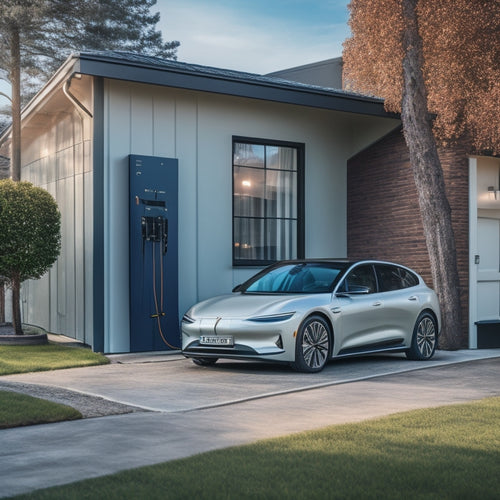
What Determines the Cost of Solar Energy for Your House?
Share
When investing in solar energy for your house, you'll find that the cost is influenced by several factors, including the system size and quality, installation company and labor, roof characteristics, local regulations and compliance, energy storage and backup systems, inverter quality and technology, monitoring and maintenance, and financial incentives. The ideal system size, panel efficiency, and type, as well as the installation company's experience and certification, all play a significant role. Additionally, roof size and complexity, local building codes, and permits can impact the overall cost. As you consider these factors, you'll gain a better understanding of how they intersect to determine the cost of solar energy for your house, and exploring these factors further will provide you with a more thorough overview.
Key Takeaways
- The size and quality of the solar panel system, including panel efficiency and type, significantly impact the overall cost of solar energy.
- The installation company's experience, certification, and labor costs, as well as permitting and inspection procedures, influence the final cost.
- Roof characteristics, such as size, complexity, orientation, and shading, affect the number of panels required and installation complexity.
- Local regulations, compliance, and permits, including building codes and zoning laws, can add to the overall cost of the solar energy system.
- Financial incentives, such as federal and state tax credits, rebates, and grants, can significantly reduce the upfront cost of solar energy for your house.
System Size and Quality
Determining the ideal system size and quality for your solar energy setup is essential, as it directly impacts the amount of electricity generated and your return on investment.
You need to evaluate your energy consumption analysis to determine how much electricity your solar panel technology should produce. A thorough analysis of your energy usage patterns will help you identify the required system size.
You'll need to assess your energy consumption during peak hours, as well as your overall energy requirements throughout the day.
When it comes to system quality, you should focus on the efficiency and durability of the solar panels. High-efficiency solar panels can generate more electricity per hour of sunlight, making them a better investment in the long run.
Additionally, look for solar panels with a long warranty period and a proven track record of performance.
Installation Company and Labor
With your ideal system size and quality in mind, you'll need a reputable installation company to bring your solar energy setup to life. The installation company you choose will greatly affect the overall cost of your solar energy system.
Their knowledge and efficiency will determine the installation process's complexity, duration, and labor costs. Here are some factors to take into account:
-
Experience and certifications: A company with extensive experience and certifications from reputable organizations, such as the North American Board of Certified Energy Practitioners (NABCEP), can guarantee a smoother installation process and higher-quality work.
-
Labor costs and warranty: Labor costs vary among installation companies, and some may offer more thorough warranties or maintenance plans, impacting the overall cost of your solar energy system.
-
Installation process: The company's installation process, including their permitting, inspection, and testing procedures, will influence the timeline and cost of the project.
Roof Size and Complexity
Since your roof will be hosting the solar panels, its size and complexity play a significant role in determining the cost of your solar energy system. A larger roof requires more solar panels to generate the same amount of electricity, increasing the overall cost.
On the other hand, a smaller roof may require more expensive, high-efficiency panels to meet your energy needs.
Roof orientation is also vital, as a south-facing roof receives more sunlight than an east- or west-facing one. This may affect the number of panels needed and their placement.
Shading issues, such as trees or neighboring buildings, can also impact the system's performance and cost. You may need to trim trees or install more panels to compensate for the lost energy production.
Additionally, a complex roof with multiple levels, skylights, or vents may require more labor and materials to install the solar panels, increasing the cost.
It's important to assess your roof's size, orientation, and complexity to determine the ideal solar energy system for your house and get an accurate cost estimate.
Local Building Codes and Permits
As you assess your roof's suitability for solar panels, you'll also need to evaluate the local building codes and permits required for installation. This is essential because local regulations can greatly impact the cost and timeline of your solar energy project.
When it comes to permits, you'll need to maneuver through the following:
-
Permit processes: You'll need to obtain permits from your local government before installation can begin. This process can take several weeks to several months, depending on the jurisdiction.
-
Inspection requirements: Your system will need to pass inspections to confirm compliance with local building codes and safety standards. This may involve multiple inspections, adding to the overall cost and timeline.
-
Zoning laws and compliance costs: Zoning laws may restrict the size or placement of your solar panel system. Make sure you understand the local zoning laws and factor in any additional compliance costs.
Understanding these local regulations and permit processes will help you plan and budget accordingly, guaranteeing a smoother and more cost-effective shift to solar energy.
Type and Efficiency of Panels
When considering solar energy for your house, you're faced with a multitude of panel options, each boasting distinct characteristics that impact your system's overall performance and cost. The type and efficiency of panels play a significant role in determining the cost of solar energy for your house.
Panel materials, such as monocrystalline, polycrystalline, and thin-film, vary in efficiency ratings, which affect energy output. For instance, high-efficiency panels made from monocrystalline silicon can convert up to 22% of sunlight into electricity, whereas thin-film panels may only achieve 7-14% efficiency.
Environmental impact is also a consideration, as some panels are made from more sustainable materials or have lower carbon footprints.
Installation technology, such as solar tracking, can also enhance energy output, but may increase upfront costs. Warranty options, ranging from 10 to 30 years, also impact the overall cost.
Aesthetic considerations, like panel color and frame type, may influence your decision as well. By understanding these factors, you can make an informed decision about the type and efficiency of panels that best suit your energy needs and budget.
Battery Backup and Storage
You'll need to evaluate energy storage options to guarantee a steady power supply during outages or when the sun isn't shining.
Your battery backup system's capacity will determine how much power you'll have available during these times, so it's crucial to choose the right size and type for your needs.
You'll want to assess factors like depth of discharge, round-trip efficiency, and warranty duration to select the best energy storage solution for your solar-powered home.
Energy Storage Options
Solar energy systems can be a reliable source of power, but their output varies with the sun's availability. You may encounter periods of low energy production, especially during nighttime or on cloudy days.
To address this limitation, you can consider energy storage options to guarantee a steady supply of power.
Energy storage systems, such as solar battery technologies, allow you to store excess energy generated during the day for later use. This way, you can reduce your reliance on the grid and enjoy a more consistent energy supply.
Some benefits of energy storage options include:
- Increased energy independence: With energy storage, you can power your home even when the sun isn't shining.
- Reduced energy waste: Excess energy is stored instead of being fed back into the grid.
- Improved energy management: Energy management systems help you monitor and control your energy usage, optimizing your energy storage and consumption.
Backup Power Capacity
Your energy storage system's backup power capacity is a critical factor in guaranteeing a steady supply of power during periods of low energy production. This is particularly important if you're looking to achieve energy independence and reduce your reliance on the grid.
When the sun isn't shining or during periods of high energy demand, your backup power capacity kicks in to provide a seamless supply of energy to your home.
The backup power capacity of your energy storage system is typically measured in kilowatt-hours (kWh). A higher backup power capacity means you'll have a greater reserve of energy to draw upon during periods of low energy production.
This is especially important for homeowners who live in areas prone to frequent grid outages or those who want to make sure their critical appliances remain operational during extended power outages.
A strong backup power capacity also enhances grid resilience by reducing the strain on the grid during peak demand periods.
Inverter Type and Quality
Three key components make up a solar energy system: panels, mounting hardware, and inverters. The inverter is responsible for converting the DC power generated by your solar panels into AC power that's usable in your home. When it comes to inverter type and quality, you have several options to evaluate.
-
Inverter efficiency: Look for an inverter with high efficiency ratings (typically above 95%) to minimize energy losses.
-
Inverter brand and warranty: Reputable brands like Enphase, SMA, and Fronius offer high-quality inverters with extensive warranties (usually 10-25 years) that cover repairs and replacements.
-
Inverter technology and compatibility: Evaluate inverters with advanced features like maximum power point tracking (MPPT) and smart monitoring capabilities. Confirm the inverter is compatible with your solar panel array and electrical system.
A high-quality inverter can greatly impact your solar energy system's performance and lifespan.
Be certain to research and compare different inverter options to find the best fit for your specific needs and budget.
Monitoring and Maintenance
Regular monitoring and maintenance are crucial to guarantee your solar energy system operates at peak performance and lasts for its expected 25-year lifespan.
You'll want to invest in advanced monitoring technology that tracks your system's performance in real-time, alerting you to any issues that may arise. This technology can detect even minor deviations from ideal performance, allowing you to address problems promptly and prevent energy losses.
The maintenance frequency will depend on various factors, including the size and complexity of your system, as well as the environmental conditions it operates in.
As a general rule, you should expect to perform routine maintenance tasks, such as cleaning the panels and inspecting the wiring, every 6-12 months. More extensive maintenance tasks, like inverter replacement and system upgrades, may be required every 5-10 years.
Federal and State Incentives
As you traverse the process of installing solar energy for your house, you'll be pleased to uncover that the federal government and many state governments offer various incentives to offset the upfront costs.
These financial incentives can greatly reduce the overall cost of solar energy for your house.
Some of the incentives you may be eligible for include:
-
Federal Tax Credit: You can claim a federal tax credit of 26% of the total cost of your solar panel system, which can be claimed on your tax return.
-
State Rebates and Grants: Many states offer rebates or grants for solar energy installations, which can range from a few hundred to several thousand dollars.
-
Utility Programs and Tax Exemptions: Some utility companies and states offer special programs, such as net metering, or exemptions from property taxes, which can help reduce your energy costs and increase your savings.
Frequently Asked Questions
Can I Install Solar Panels on My Own to Save Money?
You can attempt a DIY installation to save money, but it's essential to contemplate your electrical knowledge, local building codes, and manufacturer warranties; improper installation might negate cost savings and even void your warranty.
Will Solar Energy Increase My Property Value?
You'll be a million bucks richer, figuratively, as solar energy enhances your property value! According to studies, installing solar panels can increase your property appraisal by up to 17%, thanks to attractive solar incentives, making your home a hot commodity on the market.
Are Solar Panels Affected by Shade From Trees or Buildings?
You'll find that solar panels' efficiency takes a hit when shaded by trees or buildings, as shading effects reduce energy output; even partial shading can decrease production by up to 20%, so assess your site's conditions before installation.
Can I Sell Excess Energy Back to the Grid?
You'll be thrilled to know you can sell excess energy back to the grid through net metering policies, earning credits at attractive energy buyback rates, potentially offsetting your utility bills and maximizing your solar investment's returns!
Is Solar Energy a Viable Option for Renters?
You're wondering if solar energy is a viable option for renters; unfortunately, it's challenging due to limited renters' rights, but solar leasing can provide an alternative, allowing you to reap benefits without owning the system.
Related Posts
-

10 Essential Bike Lane Safety Features to Consider
You're designing a bike lane with safety in mind, and that's essential. The National Highway Traffic Safety Administr...
-

5 Essential Tips for Buying EV Charging Systems Online
When purchasing an EV charging system online, you'll want to make sure you're making an informed decision. First, det...
-

10 Tips for Cleaner City Air With Scooters
By adopting a few simple habits, you can make a significant impact on reducing city air pollution with your scooter. ...


